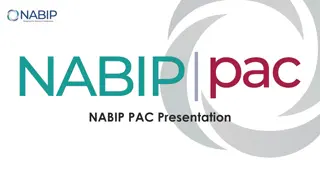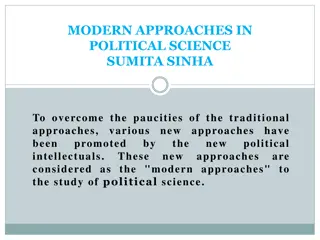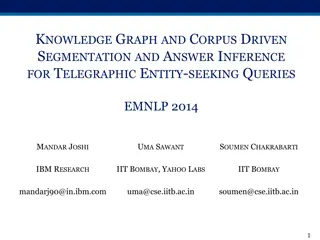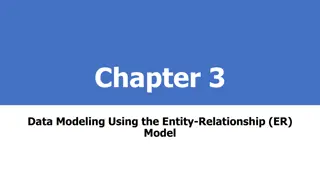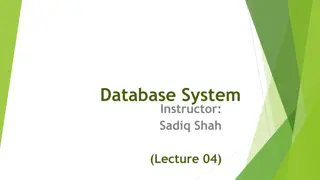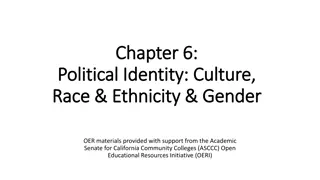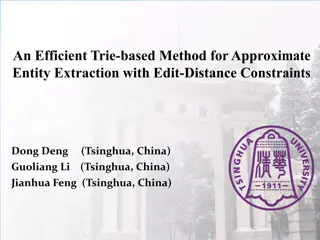Progressive Approach to Relational Entity Resolution
In this research paper authored by Yasser Altowim, Dmitri Kalashnikov, and Sharad Mehrotra, a progressive approach to relational entity resolution is presented. The study focuses on balancing cost and quality in entity resolution tasks for relational datasets. The goal is to develop a method that ac
1 views • 20 slides
Understanding NABIP PAC: Political Action Committee Overview
Federal law prohibits direct financial contributions to federal candidates, hence organizations like NABIP establish Political Action Committees (PAC) to advocate for political priorities. Learn about NABIP PAC, its accounts, eligibility criteria, contribution rules, and how funds are utilized. Disc
1 views • 14 slides
Contrasting Concepts in Political Science: Normative vs Descriptive Approaches
Normative and descriptive concepts in Political Science explore contrasting viewpoints on how things should be versus how they actually are. While normative claims focus on value judgments, descriptive claims deal with facts. These concepts complement each other by providing both theoretical and pra
0 views • 10 slides
Modern Approaches in Political Science: Overview and Characteristics
Explore modern approaches in political science pioneered by intellectuals to address the limitations of traditional methods. These approaches emphasize empirical data, interdisciplinary study, and scientific methods to draw conclusions beyond political structures and historical analysis. Key modern
1 views • 13 slides
Knowledge Graph and Corpus Driven Segmentation for Entity-Seeking Queries
This study discusses the challenges in processing entity-seeking queries, the importance of corpus in complementing knowledge graphs, and the methodology of segmentation for accurate answer inference. The research aims to bridge the gap between structured knowledge graphs and unstructured queries li
0 views • 24 slides
Interdisciplinary Approach in Political Science and Its Relation with History
The need for an interdisciplinary approach in political science emerged in the 20th century to study political issues from various social science perspectives. This approach emphasizes the interrelation between political science and other disciplines like history. History provides the foundation for
0 views • 23 slides
How to Check Status in SAM.gov
SAM.gov is a crucial site for checking the status of registrations and validations. Once logged in, users can visit the workspace to monitor their status daily, apply, or renew. The process involves validating entities, obtaining a Unique Entity ID, entering core data and assertions, completing Reps
0 views • 8 slides
Institutionalism and Methodological Issues in Political Science
Institutionalism is a foundational concept in political science, emphasizing the study of governing institutions and their role in shaping political behavior. It explores inductive and deductive approaches to research, highlighting the significance of empirical evidence and theoretical assumptions.
0 views • 19 slides
State-Sponsored Interreligious Dialogue in the Middle East: A Political Analysis
This research delves into the growth of state-sponsored interreligious dialogue initiatives in the Middle East between 2000-2020. It explores the political significance, impact on relations between political and religious authorities, and implications for religious practices in the region. The thesi
0 views • 23 slides
Understanding Gramsci's Political Theory and its Relevance Today
Gramsci's political theory, focusing on concepts such as hegemony, historical bloc, and the role of intellectuals, offers valuable insights into contemporary political challenges. Explored through the lenses of Prof. Ken Spours and Stuart Hall's analytical tradition, this analysis sheds light on Con
0 views • 13 slides
Evolution of Citizenship in Liberal Democracy
Citizenship within liberal democracy entails equal rights, duties, liberties, and constraints for individuals within a political community. The entrenchment of civil and political rights has shaped the struggle for membership and participation in political communities. Civil rights, essential for in
1 views • 11 slides
Data Modeling Using the Entity-Relationship (ER) Model
This chapter discusses data modeling using the Entity-Relationship (ER) model, covering concepts such as entities, attributes, relationships, and database design processes. It outlines the design process, entity types, value sets, key attributes, weak entities, and more. The chapter also provides an
0 views • 57 slides
Understanding Modeling Entities and Attributes in Database Systems
Entities, relationships, and attributes are fundamental constructs in the Entity-Relationship (E-R) model. Entities represent people, places, objects, events, or concepts in a user environment. Each entity type has a set of attributes defining its properties. It is crucial to distinguish between ent
2 views • 17 slides
Understanding Political Theory through a Contextual Approach
Exploring G.H. Sabine's perspective on political theory through a contextual approach, emphasizing the importance of historical context and societal influences. Sabine argues that while political theory evolves with its contemporary politics, it should be analyzed within its specific time and social
0 views • 9 slides
Understanding Public Opinion and Political Participation
Public opinion and political participation are influenced by various factors such as financial interests, family, education, and party identification. Measuring public opinion accurately through scientific surveys is crucial in a democracy. Traditional participation methods like voting and civic vol
5 views • 7 slides
Unified Volunteering Platform: Host Entity Account Management Training Update
Explore the recent updates in the Unified Volunteering Platform focusing on Host Entity account management training, webinars for UN Host Entities, and the launch of new self-service features. Learn about the roles within Host Entity accounts and the transition to the new system. Contact support for
0 views • 7 slides
Entity-based Memory Network for Text Comprehension
Entity-based Memory Network is a model designed for text comprehension, focusing on question-answering tasks in both open and closed domain QA. It incorporates features like distributed representation, feature modeling, and memory models at various levels to generate output features, predict answers
0 views • 17 slides
Analysis of Facebook Affordances for Political Parties During the 2014 EU Elections
Research by Karolina Koc-Michalska and Darren Lilleker explores how political parties across 28 countries utilized Facebook affordances during the 2014 European Parliament elections. The study investigates the impact of social media on voter behavior, community building, and political engagement. Fi
0 views • 22 slides
Liberal Democracy and Citizenship: Rights, Duties, and Participation
Citizenship in liberal democracies entails equal rights, duties, liberties, and constraints, with a focus on civil and political rights. The entrenchment of these rights has been key in establishing popular sovereignty and individual autonomy. Civil rights, developed in the 18th century, centered on
2 views • 16 slides
Understanding Political Beliefs and Behaviors: A Comprehensive Overview
Explore the formation, evolution, and transmission of political beliefs, as well as the impact of differing beliefs and behaviors on the political process. Delve into platform issues, political affiliations, and their influences to gain a deeper understanding of the political landscape.
1 views • 53 slides
Understanding Nationalism in Political Science
Nationalism, a complex concept, defines the nation as the fundamental unit of political rule. It encompasses a mix of objective and subjective factors, including cultural, ethnic, and political traits. The definition of a nation is subjective, based on how its members perceive themselves as a distin
0 views • 27 slides
Empowering Women in Politics through Media Training in Johannesburg
Regional Media Training on Women's Political Participation held in Johannesburg focused on enhancing women's role in politics through media. The program highlighted successful female political leaders, aiming to change gender norms and increase women's political representation. Key objectives includ
0 views • 10 slides
Understanding Political Science: A Comprehensive Overview
The study of political science delves into various aspects, from the pursuit of the good society to the exercise of power and the allocation of resources. It encompasses specialized fields such as American politics, international relations, comparative politics, public policy, and political philosop
0 views • 5 slides
Understanding Entity Framework in C# for Database Management
Entity Framework in C# offers a powerful ORM solution for data manipulation and database management. It allows developers to work with databases in an object-oriented manner, simplifying the handling of database operations. Learn about ORM, Code First approach, conventions, DbContext usage, and data
0 views • 21 slides
Political Development Theory and Practice: An Overview
Political development refers to the evolution of institutions forming the political power system of a society. Initially popular in the 60s-70s to describe political change, it later fell out of favor for being Euro-centric but has since regained significance. The concept encompasses aspects like po
0 views • 13 slides
Political Party Funding Act 2018 Overview
The Political Party Funding Act of 2018 in South Africa aims to enhance multi-party democracy by regulating the funding and donations to political parties. It establishes the Multi-Party Democracy Fund funded by private sources, alongside the existing Represented Political Party Fund. The Act prohib
0 views • 17 slides
Understanding Political Party Funding Act of 2018
The Political Party Funding Act of 2018 regulates the funding of political parties in South Africa, ensuring equitable and proportional funding for parties participating in national and provincial legislatures. The Act defines various terms such as donations, foreign persons, and political parties,
0 views • 42 slides
Evolution of Political Ideas and Influences on American Founding
In the history of politics, major ideas like laws of nature, unalienable rights, divine right of kings, social contract theory, and rights of resistance have influenced the American founding. Various traditions such as Judeo-Christian, English common law, Enlightenment, and republicanism played a si
0 views • 68 slides
Automated Knowledge Base Construction: Taxonomy Induction and Entity Disambiguation Overview
Explore the foundations of automated knowledge base construction through taxonomy induction and entity disambiguation frameworks. Learn about organizing and distinguishing entity types, the significance of structuring entities like physicists, villages, and chemical formulas. Delve into the inputs,
0 views • 53 slides
Explore the Fascinating World of Political Science
The Department of Political Science offers a range of courses, delving into topics such as political theory, international relations, and governance. Understand the distinction between politicians and political scientists, and explore branches of political science like public administration and huma
0 views • 16 slides
Understanding Political Identity: Culture, Race & Gender in Society
Explore the intricate aspects of political identity, culture, race, ethnicity, and gender in society. Discover how individuals shape their identities and the impact of political mobilization on society. Uncover the significance of political socialization and the role of societal institutions in shap
0 views • 20 slides
Registered Agents Requirement for Business Entities in Colorado
Colorado law requires every domestic and foreign business entity operating in the state to maintain a registered agent. This agent can be an individual, a domestic entity, or a foreign entity with a place of business in Colorado. The registered agent is authorized to receive legal documents and noti
0 views • 9 slides
Evolution of Political Protests in Modern Russia: A Historical Overview
This article provides an in-depth analysis of the evolution of political protests in modern Russia from 1990 to present. It discusses the attitude of Russian journalists towards protests, basic concepts of political protest in modern political science, myths surrounding protests in Russia, and the f
0 views • 24 slides
Impact of Political Stability on Equity Trading Costs of Cross-Listed Firms
The research explores the relationship between political stability and equity trading costs of cross-listed firms, highlighting the impact of political institutions, liquidity, and investor protection. It delves into the importance of factors like quality of political institutions, transparency, and
0 views • 24 slides
Interdisciplinary Relationships in Political Science
Political science and history share a symbiotic relationship, with history providing the foundation for political analysis while political science influences historical events. The contribution of economics to political science is evident in how economic conditions shape political ideologies and pol
0 views • 12 slides
Understanding Political Theory: Definitions, Differences, and Significance
Political theory encompasses systematic explanations of political phenomena, distinct from political thought which involves ideas and opinions of philosophers. It constitutes both political science and philosophy, addressing both empirical and evaluative aspects. The significance lies in finding sol
0 views • 7 slides
Remedial Measures Implemented by Indian Political Party
Explore the impactful remedial measures taken by a prominent political party in India through a collage presentation. Delve into the functions of political parties, understanding partisanship, the necessity of political parties, and more. Gain insights into the significance and role of political par
0 views • 23 slides
Trie-based Entity Extraction Framework for Dirty Real-World Data
Researchers from Tsinghua University, China, have developed a Trie-based framework for entity extraction in real-world data, addressing challenges such as dirty data and typos in author names and titles. The framework leverages Trie-based algorithms to optimize partition schemes and extract named en
0 views • 56 slides
Entity-specific Rankings of Knowledge Base Properties
Towards entity-specific rankings of knowledge base properties, this research explores the problem of property ranking for entities based on their attributes and properties. Various applications in knowledge base curation and natural language generation are discussed, along with related work in entit
0 views • 26 slides
Debugging Blocker in Entity Matching using MatchCatcher
Explore how the MatchCatcher solution helps identify and improve matches killed off by blockers in the entity matching process. The solution allows users to quickly find and analyze these matches, enhancing the efficiency of the blocking stage in entity matching.
0 views • 24 slides

